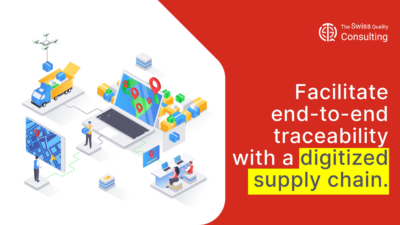Revolutionizing Supply Chain Management with Digital Traceability: Strategies to Facilitate End-to-End Traceability with a Digitized Supply Chain
In the dynamic world of business, the concept of facilitating end-to-end traceability with a digitized supply chain is increasingly becoming a focal point for companies seeking efficiency and transparency. This article, tailored for business executives, mid-level managers, and entrepreneurs, will explore the transformative impact of digital technologies in achieving comprehensive traceability in supply chain management.
The Imperative of End-to-End Traceability
In today’s interconnected and complex global supply chains, end-to-end traceability has emerged as a critical differentiator for businesses seeking to achieve operational excellence, enhance product quality, and ensure compliance with evolving regulatory standards. End-to-end traceability encompasses the comprehensive tracking and monitoring of products, materials, and information throughout the entire supply chain lifecycle, from the procurement of raw materials to the delivery of finished goods to consumers. This granular visibility into every stage of the supply chain provides businesses with invaluable insights into the provenance, movement, and status of their products, empowering them to make informed decisions that drive efficiency, quality, and compliance.
Implementing end-to-end traceability involves the integration of advanced technologies, such as barcodes, RFID tags, sensors, and blockchain, to capture and store data at each stage of the supply chain. This data, encompassing information about product origin, production processes, logistics movements, and quality control measures, is then aggregated and analyzed using sophisticated data analytics tools. The resulting insights provide businesses with a real-time understanding of their supply chain operations, enabling them to identify potential issues, optimize processes, and make proactive decisions to prevent disruptions and ensure product integrity.
The benefits of end-to-end traceability extend far beyond operational efficiency. By providing a transparent view of the supply chain, businesses can effectively manage product recalls, ensure the authenticity of their products, and protect against counterfeiting. This enhanced transparency fosters consumer trust, strengthens brand reputation, and mitigates potential legal and financial liabilities.
Moreover, end-to-end traceability plays a pivotal role in ethical sourcing and sustainability initiatives. By tracking the origins of raw materials and components, businesses can ensure that their products are sourced from responsible suppliers and adhere to ethical labor practices and environmental standards. This commitment to sustainability aligns with growing consumer demand for ethical products and enhances corporate social responsibility.
In conclusion, end-to-end traceability has become an indispensable tool for businesses seeking to navigate the complexities of the modern supply chain and achieve operational excellence, product quality, and regulatory compliance. By harnessing the power of advanced technologies and data analytics, businesses can gain a holistic understanding of their supply chain operations, make informed decisions, and foster consumer trust, ultimately propelling their organizations towards sustainable growth and success.
Benefits of a Digitized Supply Chain
Digitizing the supply chain offers numerous advantages, including improved accuracy, reduced operational costs, and faster response times. By leveraging digital tools, businesses can gain real-time insights, enhance decision-making, and significantly improve their responsiveness to market changes and customer demands.
Change Management for Digital Transformation in Supply Chains
Successfully implementing a digitized supply chain requires effective change management. This involves transitioning from traditional, often manual processes to sophisticated, technology-driven operations. The change requires strategic planning, training, and a commitment to cultural shift within the organization.
Executive Coaching in Digital Supply Chain Implementation
Executive coaching plays a vital role in guiding leaders through the intricacies of digital supply chain transformation. It equips them with the necessary skills and knowledge to lead their teams effectively, ensuring a smooth transition to a digitized system.
Generative AI: A Game-Changer in Supply Chain Traceability
Generative Artificial Intelligence (AI) is rapidly changing the landscape of supply chain management. AI technologies can analyze vast amounts of data, predict supply chain disruptions, and optimize logistics, further enhancing the traceability and efficiency of digitized supply chains.
Effective Communication in Supply Chain Digitalization
Effective communication is critical in the digital transformation of supply chains. It ensures that all stakeholders are informed, engaged, and aligned with the new digital processes. Clear communication strategies facilitate smoother transitions and greater acceptance of new technologies.
Project Management in Digital Supply Chain Initiatives
Robust project management is crucial in implementing digitized supply chains. This involves setting clear goals, allocating resources, and monitoring progress to ensure successful execution of digital traceability initiatives.
Conclusion: Embracing Digital Transformation for Supply Chain Excellence
In conclusion, facilitating end-to-end traceability with a digitized supply chain is a strategic move for businesses aiming to enhance efficiency and transparency. Through effective change management, executive coaching, generative AI, and strong project management, companies can successfully embrace this digital transformation, paving the way for innovation and long-term success.
#SupplyChainManagement #DigitalTraceability #BusinessTransformation #ExecutiveCoaching #GenerativeAI #ProjectManagement























